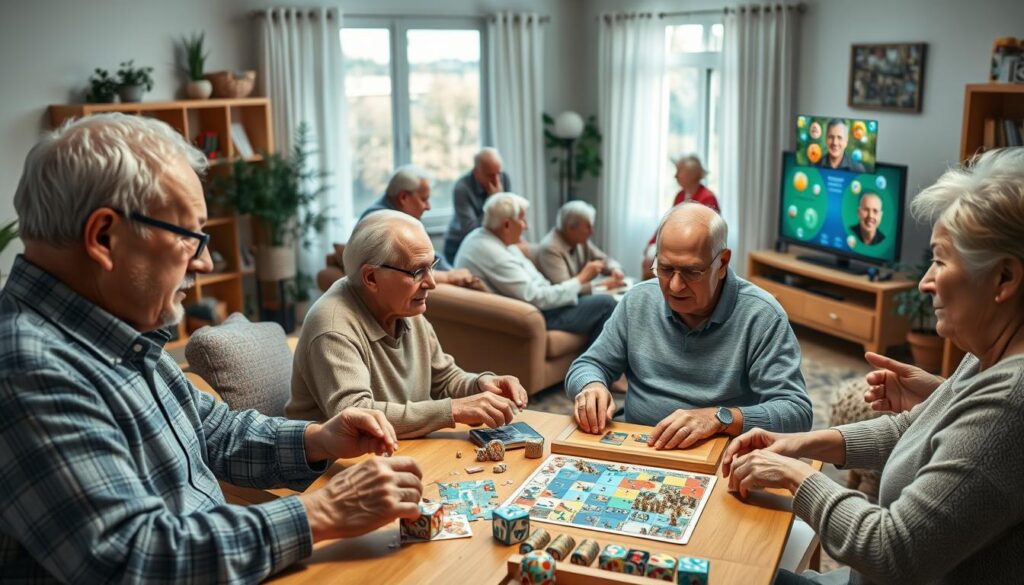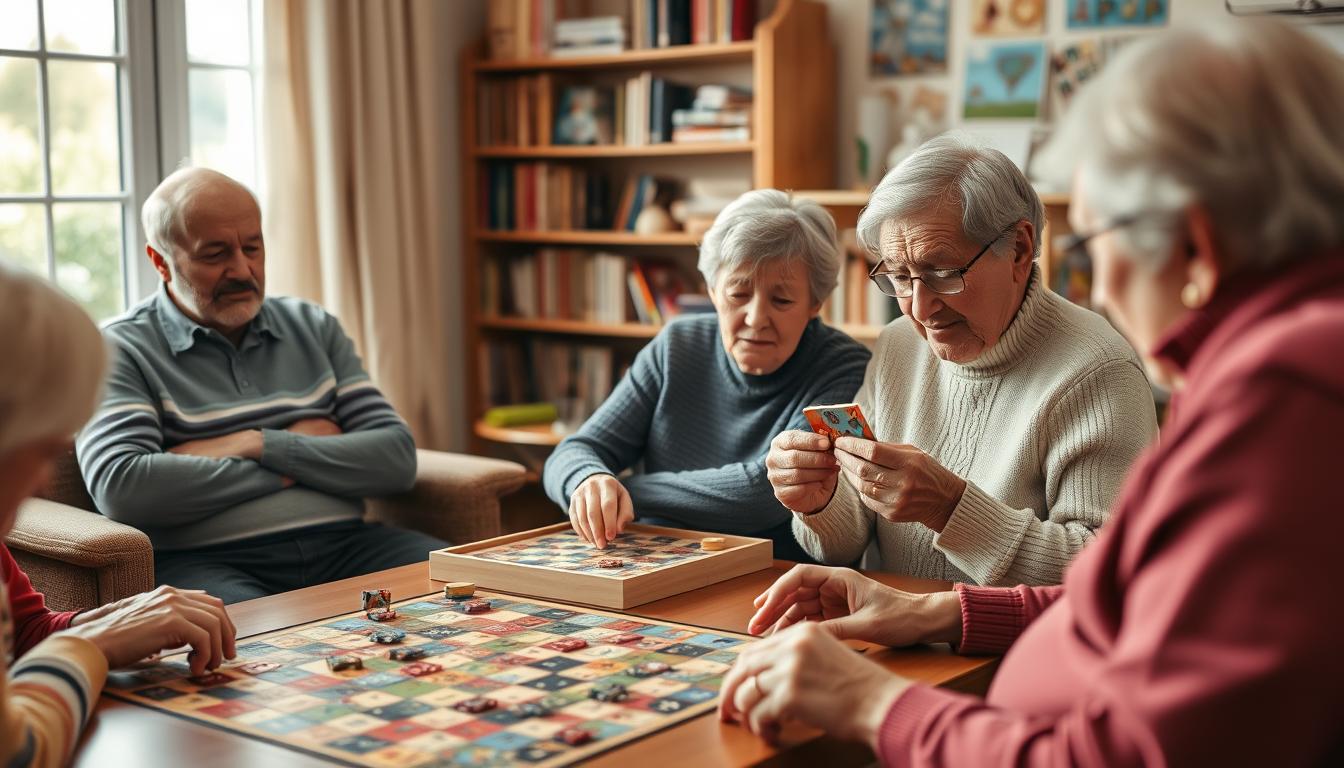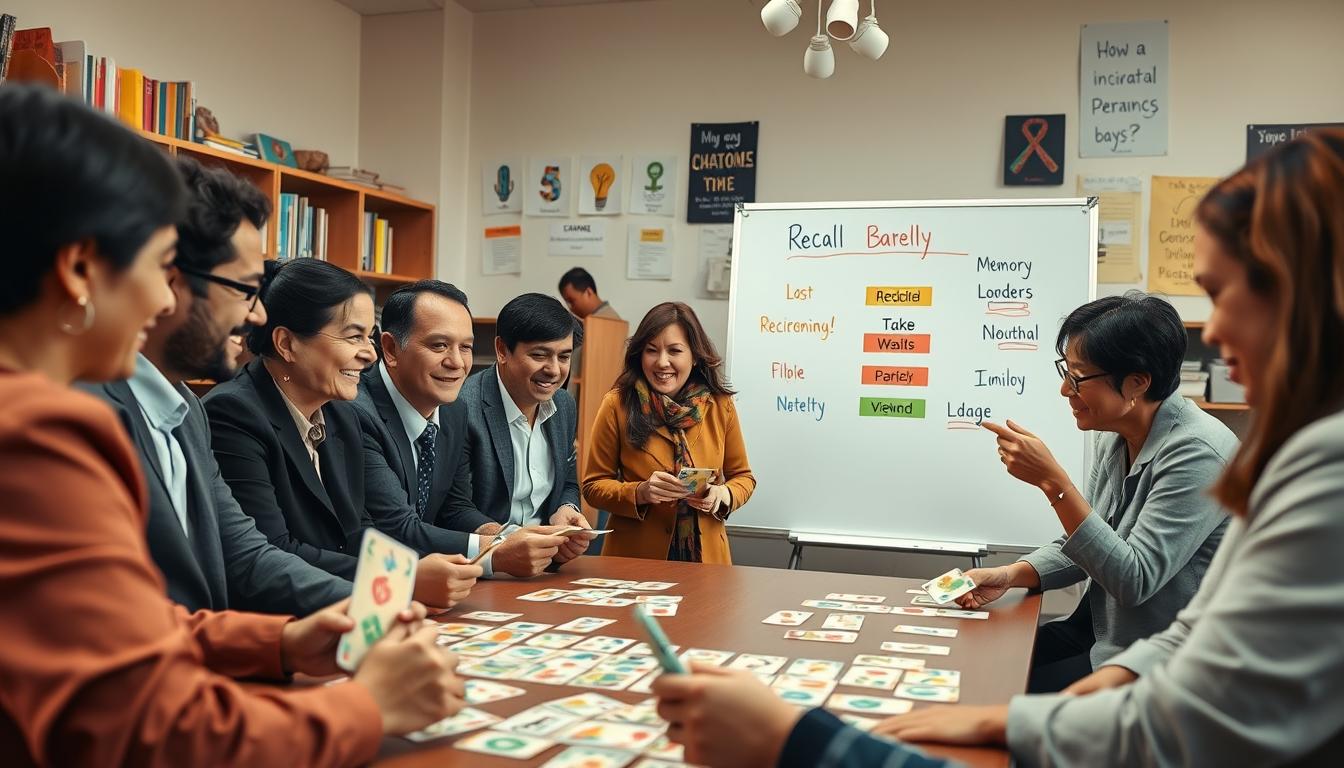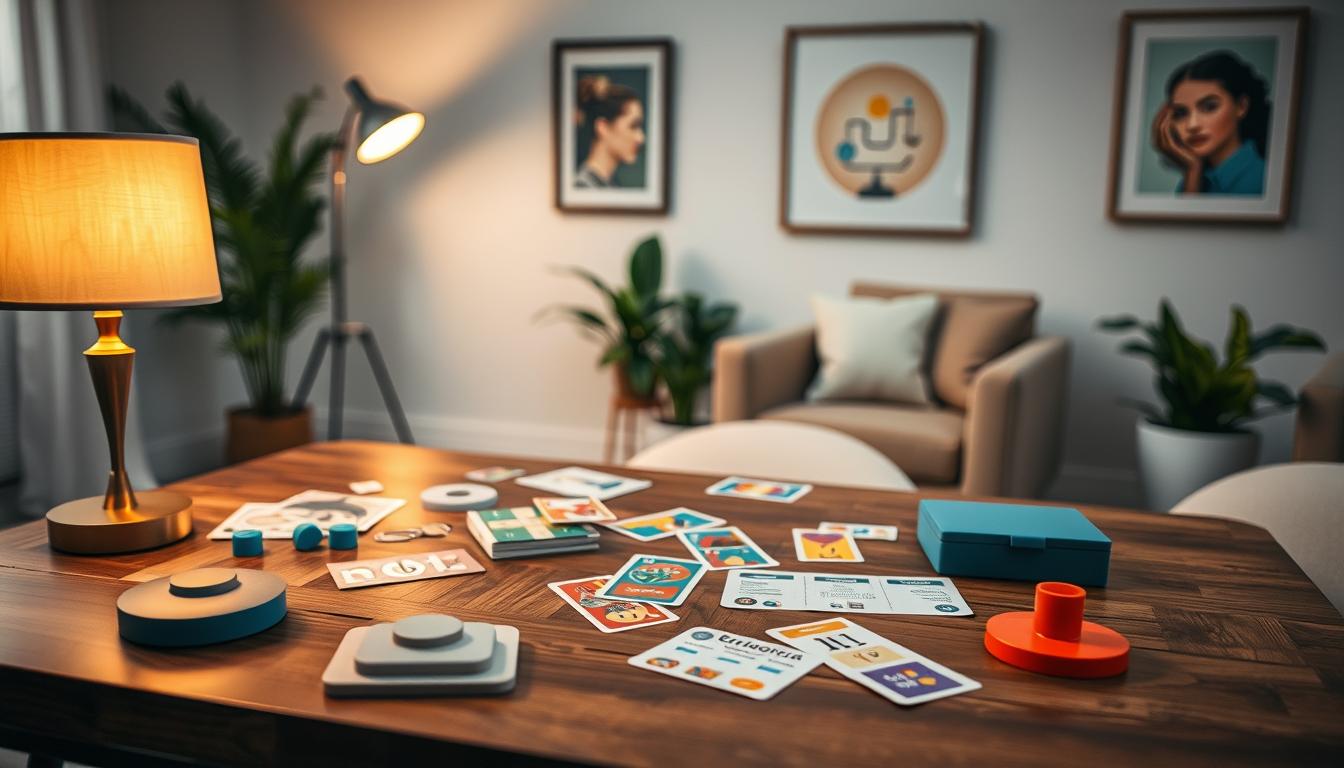Top 5 games for seniors focused on logical reasoning and motor coordination
Have you ever thought about how simple games can boost mental health for seniors? Playing brain games sharpens thinking and improves motor skills. These games are key for keeping the mind sharp as we get older.
Let’s explore why these games matter and find the top five activities. They will keep your mind and body active.
Introduction to Brain Games for Seniors
Brain games for seniors are key to keeping their minds sharp. They offer mental challenges that boost memory, attention, and thinking skills. Playing these games regularly helps seniors stay mentally active and enjoy a more vibrant life.
Studies show that brain training games improve mental health in seniors. These games not only strengthen the mind but also encourage socializing. Playing with others adds a fun social element, making health care more holistic for older adults.
Adding brain games to daily life is both fun and good for the mind. It lets seniors challenge themselves and connect with loved ones. This makes life more engaging and fulfilling.

Importance of Cognitive Stimulation for Seniors
Cognitive stimulation is key for seniors wanting to keep their brains sharp. Activities that challenge the mind are like exercise for the brain. They help improve memory and thinking skills.
Studies show that seniors who do puzzles and play games can strengthen their brain connections. This leads to better reasoning and thinking.
Stimulating activities can greatly improve memory. As people get older, keeping the brain active is more important than ever. It helps prevent memory loss and keeps the mind sharp.
By making mental exercises a part of their daily lives, seniors can live better. They can delay memory problems and enjoy a higher quality of life.
Benefits of Playing Games for Aging Adults
Playing games has many benefits for older adults. It helps improve problem-solving skills and memory. These games keep the brain sharp as we age.
Games also help people connect with others. They bring family, friends, and caregivers together. This helps fight loneliness and boosts mental health.
Games can also improve hand-eye coordination. This mix of mental and physical exercises helps aging adults grow. It creates lasting memories and strengthens bonds.
Top Game Recommendations for Logic and Coordination
Playing games that boost logical thinking and coordination is fun and good for seniors. Choosing the right games can entertain and improve their thinking and movement skills.
Here are some top picks that mix fun with brain and body benefits:
- Sudoku: A classic, Sudoku tests your logic and makes you feel proud of your achievements.
- Trivia Quizzes: They boost your brain and start interesting talks, making social time more fun.
- Memory Tray Games: These games help you remember things and improve your coordination.
- Jigsaw Puzzles: Great for improving hand-eye coordination and solving problems.
- Bingo: A mix of luck and strategy, it’s good for your brain and social life.
Adding these games to your routine can really help your brain and body stay sharp. They’re great for seniors who want to stay active and mentally sharp.
Sudoku: A Classic Game for Logical Thinking
Sudoku is a favorite game that mixes fun with brain exercises. It’s a logic puzzle that attracts many fans. It’s also great for improving thinking skills.
Playing Sudoku needs logical thinking, planning, and memory. It’s perfect for seniors who want to stay mentally sharp.
How Sudoku Enhances Cognitive Function
Sudoku boosts brain activity in many ways. It challenges players to figure out where numbers go. This sharpens short-term memory and analytical skills.
As players solve puzzles, they get better at solving problems and thinking strategically. Regular Sudoku play can make seniors’ minds sharper and more alert.
Finding Sudoku Resources for Seniors
There are many Sudoku resources for seniors. They can find books with different levels of difficulty or try online platforms and apps. These options let players adjust the game to their liking.
Playing Sudoku regularly boosts confidence and gives a sense of accomplishment. It’s good for mental health.
Trivia Quizzes: Fun and Engaging Mental Exercise
Trivia quizzes are a fun way for seniors to keep their minds sharp. They can be simple yet powerful, bringing back memories and fostering friendships. Hosting a trivia night at home can turn a simple get-together into a lively event.
Creating a Trivia Environment at Home
To create a fun trivia atmosphere, try these ideas:
- Organize team games to encourage collaboration and camaraderie.
- Use a whiteboard or large paper for scoring to add a competitive edge.
- Offer small prizes to winners to motivate participation.
These tips can make trivia nights more fun and engaging for everyone.
Popular Trivia Topics for Seniors
Choosing the right topics is key to enjoying trivia quizzes. Seniors often enjoy questions about:
- Classic music and artists from their youth.
- Iconic movies loved over the decades.
- Historical events that shaped their lives.
- Family-oriented questions that trigger nostalgia.
Using these themes can make the activity more enjoyable, leading to laughter and bonding among participants.
Memory Tray Game: Combine Memory and Coordination
The memory tray game is a fun activity that helps seniors improve their memory and coordination. It involves a tray with different objects for players to look at and remember. When the tray is covered, players must recall what they saw, making it a fun way to boost memory.
This game also helps with hand-eye coordination. Players have to handle objects, which sharpens their motor skills and boosts brain function. It’s a great way to work on memory and coordination at the same time.
The memory tray game is great for all kinds of groups. You can change the objects to make the game easier or harder. This makes it fun and challenging for everyone, helping them grow mentally and physically.
| Feature | Memory Tray Game |
|---|---|
| Target Skills | Memory enhancement, coordination |
| Physical Engagement | Handling objects |
| Adaptability | Varies difficulty levels |
| Group Suitability | All cognitive levels |
Brain Games for Seniors with Logic and Coordination
Brain games with logic puzzles are great for seniors wanting to keep their minds sharp. They help improve thinking skills and boost cognitive development. These games make players think deeply, solve problems, and get better at reasoning.
There are many types of puzzles for seniors at all levels. This means everyone can find something fun and challenging. It’s a great way to keep the mind active and engaged.
Exploring Various Logic Puzzles
Logic puzzles include riddles, brain teasers, and more. Each one works on different thinking skills, helping with problem-solving and coordination. Solving these puzzles keeps the brain active and supports cognitive growth.
Seniors who play these puzzles enjoy a fun activity that also boosts their brainpower. They get better at logical thinking and solving problems. The puzzles can be adjusted to fit each person’s skill level, making them perfect for many seniors.
Jigsaw Puzzles: A Fun Way to Boost Coordination
Jigsaw puzzles are a fun way for seniors to get better at coordination and thinking. They need to remember what they see and solve problems to put the pieces together. This activity helps improve concentration and fine motor skills.
When picking jigsaw puzzles, choose ones that fit their interests and skills. Puzzles with bigger pieces are easier to handle. Pictures that are bright and interesting make the puzzle more fun. The right puzzle should be challenging but not too hard, making it a rewarding experience.
Choosing the Right Jigsaw Puzzles for Seniors
It’s important to find the right jigsaw puzzles for seniors. Look for these features:
- Piece Size: Larger pieces are easier to handle and don’t strain the eyes.
- Image Themes: Pick themes that seniors like, like nature or famous art, to keep them interested.
- Piece Count: Start with puzzles that have 300-500 pieces. This is a good number for most seniors.
- Quality: Choose puzzles made from strong materials that can handle being handled a lot.
Adding jigsaw puzzles to daily activities can help improve coordination. They can be fun to do alone or with others. Solving puzzles together can help people connect and work towards a goal.
Bingo: Social Interaction and Cognitive Stimulation
Bingo is a favorite among seniors, offering a space for socializing and mental exercise. It brings happiness and acts as a brain workout. This classic game can boost memory and speed up thinking.
Health Benefits of Playing Bingo
Playing Bingo has many health perks for older adults. It helps build a sense of community and belonging. The game also sharpens listening skills and improves hand-eye coordination.
It’s great for emotional health too. Bingo fights off loneliness and isolation, common in seniors. It fosters friendship and support among players.
Studies show Bingo is good for mental health. It’s easy to play and keeps the brain active without feeling too hard.
| Health Benefit | Description |
|---|---|
| Enhanced Social Interaction | Encourages connections and friendships among participants. |
| Improved Cognitive Skills | Strengthens memory, attention, and processing speed through gameplay. |
| Better Hand-Eye Coordination | Involves marking cards, enhancing fine motor skills. |
| Combat Loneliness | Provides a joyful atmosphere for socializing, reducing feelings of isolation. |
Crossword Puzzles: Enhancing Vocabulary and Reasoning Skills
Crossword puzzles are great for seniors who want to boost their vocabulary and thinking skills. They make you remember words and use your knowledge in smart ways. Each puzzle has clues that mix memory and understanding, keeping your brain busy.
You can find crossword puzzles in newspapers, magazines, and online. This makes it easy for seniors to get them, no matter their skill level. Whether you’re new to puzzles or have been doing them for years, there’s always something fun to try.
Doing crossword puzzles regularly helps your brain grow. It improves your problem-solving and word recognition. As you solve each puzzle, you feel proud of yourself, which is good for your happiness.
| Benefits of Crossword Puzzles | Description |
|---|---|
| Vocabulary Enhancement | Helps seniors learn new words and improve language skills. |
| Cognitive Engagement | Stimulates mental activity and keeps the mind sharp. |
| Problem-Solving Skills | Encourages strategic thinking and reasoning. |
| Access and Availability | Readily found in print and online, suitable for all skill levels. |
Tips for Encouraging Seniors to Play Games
Getting seniors to play games can make their lives better in many ways. Organized group activities help them connect and have fun. Making places welcoming can make them feel more at ease playing with others.
It’s important to make games easy for older adults to understand and play. Choosing games that match their interests can make them more excited to play. This way, games become fun and help keep their minds sharp.
Games that encourage teamwork or shared experiences can help build lasting friendships. Creating a supportive atmosphere around game nights or casual meetups can encourage seniors to try new things. This helps improve their mental health and well-being.
| Strategies for Encouraging Participation | Impact |
|---|---|
| Organizing Group Activities | Increases social interaction and reduces isolation |
| Providing Accessible Games | Minimizes frustration and fosters enjoyment |
| Aligning Games with Interests | Keeps seniors engaged and motivated |
| Promoting Team-Based Play | Encourages camaraderie and shared experiences |
Conclusion
Playing brain games is key for keeping seniors’ minds sharp. It boosts their overall happiness. These games help with thinking clearly and moving better. They also help seniors connect with others, which is vital for feeling part of the community.
Adding these games to daily life brings many benefits. Seniors see better mental health, remember things better, and feel more fulfilled. Brain games keep the mind sharp and active, improving life quality.
Encouraging seniors to play brain games is a great way to improve their thinking skills. It also helps them enjoy life through fun challenges and making friends. As they age, focusing on these activities is a smart move. It helps them stay mentally and physically fit.
FAQ
What are brain games, and why are they important for seniors?
Brain games are activities made to boost thinking skills in seniors. They help keep the mind sharp by improving memory and thinking. They also help seniors feel connected and happy.
How do brain games affect cognitive health in aging adults?
Brain games work like exercise for the brain. They make the brain’s connections stronger. This can make memory better, thinking clearer, and slow down mental decline.
Can playing games improve social connections among seniors?
Yes, games help seniors meet and talk with others. This reduces loneliness and builds a sense of belonging.
What types of games are best for enhancing logical reasoning and motor skills?
Games like Sudoku, trivia, and jigsaw puzzles are great. They challenge the mind and improve hand-eye coordination. They suit many interests and skill levels.
How can seniors find resources for brain games?
Seniors can find games in books, online, and apps. Libraries and community centers also have games for all levels.
What are the benefits of playing Bingo for seniors?
Bingo boosts social skills and sharpens hearing and hand-eye coordination. It’s a fun way to fight loneliness.
How can caregivers encourage seniors to participate in brain games?
Caregivers should make a welcoming space and plan group games. Tailoring games to interests makes it more fun and engaging.
Are there any specific puzzles that can enhance vocabulary in seniors?
Crossword puzzles are excellent for vocabulary and thinking. They challenge the mind and are available for all skill levels.














